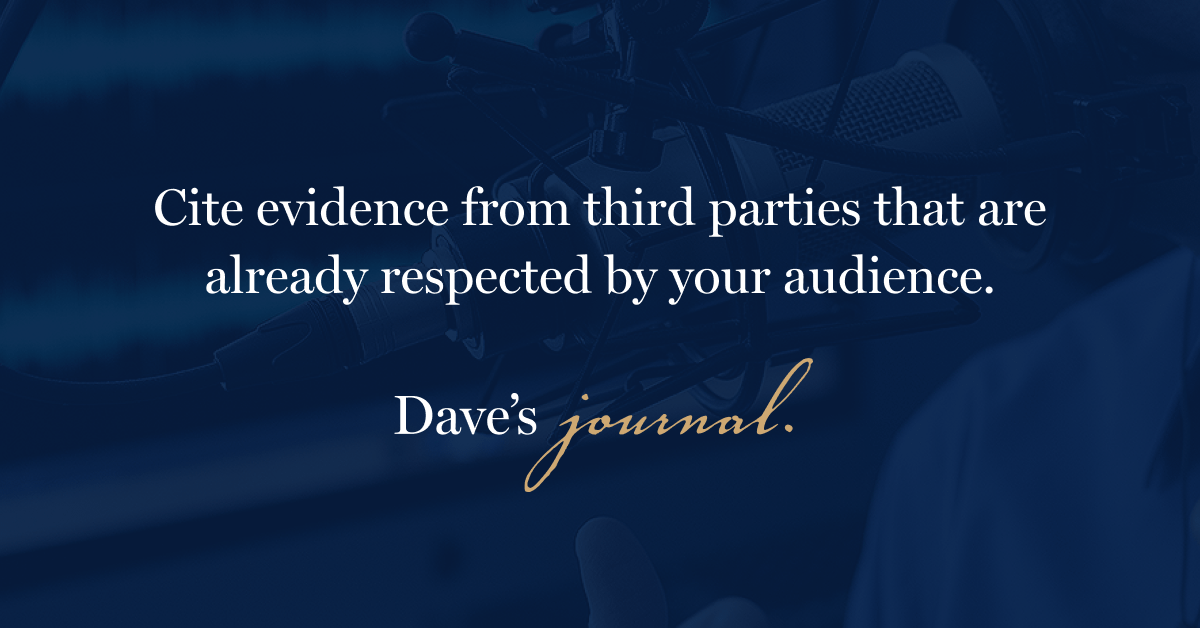You may have discovered this journal because of the podcast I’ve hosted since 2011 called Coaching for Leaders.
Although for many years producing and hosting Coaching for Leaders was very much a hobby, the listening audience has grown quite substantially to the point where we are now passing 10 million episode downloads.
One of the interesting side effects of producing a popular podcast is that I get pitched all the time by potential guests and their agents who want to appear on the show. Often, I get 4-5 of these pitches a day. This is a wonderful problem to have.
While I at least glance at everything that comes across my desk, I ignore the vast majority of these pitches. There are lots of reasons for this, but a big one is credibility.
Most people approach a pitch with some version of, “Here’s the beautiful website that I have, and the amazing book I’ve written, and how much wisdom I have to support your listeners.” And sometimes, all those things are true.
What I can’t help but wonder when I get messages like this though, is who says so other than just you?
One of the most common skills I taught leaders during my time as a Carnegie instructor was how to facilitate question and answer sessions. Most people, when asked by an audience about their proposal, recommendation, or request, frame their responses with their own opinions.
There is a time and a place for your opinion. If you already have a lot of credibility with an audience, your opinion can go a long way.
However, a lot of us find ourselves needing to influence individuals and groups where we don’t yet have a lot of credibility. When that’s the case, opinions aren’t good enough.
In those situations, credibility comes from providing evidence. One of the best ways to do that is to cite an independent, third party that is respected by the audience you want to influence.
Here’s an example of the kind of pitch that most people make — one without third party credibility:
Next quarter, I recommended we invest in a new, customer support platform. It’s going to help our customers get personal attention from us and respond more quickly and effectively to maintain great relationships. It will almost certainly help us retain more customers if we have a system that helps us show up as more human and personal.
Not a bad claim — probably true for a lot of businesses that are growing quickly.
Now, consider this version of the same pitch:
Next quarter, I recommended we invest in a new, customer support platform. Last week, I spoke with two of our association partners who have already made this move in their organizations. Both of them reported increased customer retention and one has tracked data showing a 10% increase in retention over the last six months.
The request is exactly the same in both cases. In second example, the perceived risk to the person you are attempting to influence is lessened by demonstrating how an idea like yours has already produced results for another organization they know and respect.
People rarely say this out loud, but almost always an audience you don’t already have a lot of credibility with is asking the question:
Who says so other than you?
The mistake that people make when citing third party evidence is tracking down sources that are impressive to the person making the pitch, but not necessarily to anybody else. The key point is to find and cite evidence from third parties that are already respected and trusted by your audience, not just you.
If you don’t have credibility with an audience today, find the third party evidence that will support your ideas. You may still not get what you want, but you’ll earn the attention and consideration of others more consistently.
Dave's Journal is available by audio on Apple Podcasts, Google Podcasts, Overcast, Stitcher, and Spotify.





